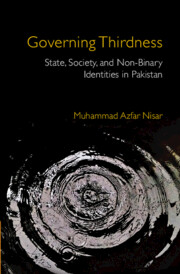Book contents
9 - Governing Thirdness on the Street
Published online by Cambridge University Press: 10 December 2021
Summary
If We Don't Beg, Should We Do Burglaries?
The governments are so arbitrary. They are creating strange laws. They may create a new strange law any day … Allah will hold them accountable one day. (Farzana)
The Department of Social Welfare, Women Development and Bait-ul-Maal, commonly called the Social Welfare Department (SWD), of the Government of Punjab launched a rehabilitation programme for beggars in 2014 to minimize begging in urban public spaces in Lahore. Under this programme, which was similar in its ambitions to the anti-panhandling and anti-homeless laws in multiple parts of the world, the individuals caught begging at urban public places were brought to the Beggars’ Home (also known as beggars’ rehabilitation center), a welfare facility established by the SWD where the beggars were detained for a few days and also provided medical and religious treatment and vocational training. According to the official website of the SWD, the khawaja sira were provided free medical, vocational, and religious treatment. However, in practice, no vocational or technical training is provided. Instead, the Beggars’ Home worked primarily as a detention centre where the beggars were kept hidden from the public eye under the guise of rehabilitation.
Since begging was the most common way the khawaja sira were able to eke out a living, they had been disproportionately affected by this programme.
They stop us from begging. What do we do if we don't beg? Look at our clothes, our shoes. The winter is coming. If we don't beg what do we do? (Nargis)
You tell us what we should do if we don't beg. Should we do burglaries? We have to beg to stay alive. They have created this new rule out of nowhere [that we can't beg]. They don't listen to anyone. One can't appeal to their decision. The people [begging] on the roads [at traffic signals] men, women, and us, we have to carve out a living by begging. We can't do daily wages labour; we don't have any family to support us. Should we just jump in water in die? (Rosy)
Indeed, given their trying financial situation, many considered begging to be one of their most fundamental rights in society.
This is so unfair that people from other cities can come to Lahore and earn a living but the khawaja sira who are descendants [jaddi] of the area are not allowed to beg. (Saeeda)
- Type
- Chapter
- Information
- Governing ThirdnessState, Society, and Non-Binary Identities in Pakistan, pp. 153 - 168Publisher: Cambridge University PressPrint publication year: 2022



